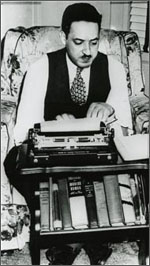Howard Law School had been overhauled by a demanding and ambitious Harvard Law School graduate named Charles Hamilton Houston. A protégé of Harvard professor Felix Frankfurter (later a U.S. Supreme Court Justice), Houston was an exacting and inspiring mentor to Marshall. Houston used his classroom at Howard like an anvil, pounding out a generation of exceptional black attorneys for a coordinated attack on Jim Crow laws.
Listen
Marshall: I of course couldn't go to the University of Maryland because they wouldn't take Negroes. So I went over to Howard in 1930, and began law school, and for the first time in my life, I studied. The rest of the time, I just eased along-you know, do good enough to pass. But in the law school, I realized, that was it. And in my first year, I really studied, and the best example of it is that I lost fifty-five pounds in one year.
I had to commute from Baltimore to Washington, which meant I got up around five in the morning and got home around eight, and then worked after I got home. As a result of that, I came out top man in my class, and that pushed me up to the position of being the student librarian. That took care of half of my tuition payments. I, of course, finished at the top of the class.
During that time, Dean Charles H. Houston was the vice-dean. He was a graduate of Amherst and Harvard, and had a SJD degree, which is a graduate degree in law. Very brilliant, very decent person, but a very hard man. Prior to his taking over, Howard was not a good law school, and he wanted it to be accredited and managed to do it in about two or three years. He used to tell us, in our first year, to look at the man on your right and look at the man on your left, and bear in mind that two of you won't be here next year. Well, that sort of kept your feet to the fire.
Then he put in another rule called the cutback, which was that regardless of the mark you made in your examination, the professor could take five points off for no reason at all, which meant, you had to get five over in order to get along.
In the library, as student librarian, I didn't have anything to do but watch over the law books, so in my spare time I read them. And that didn't hurt.
Then we started sitting around with Charles Houston and William H. Hastie, who just died a year or so ago, and Andrew Ransom-people like that-and we began to work out this attack on the segregated school system. We talked about it. We did research on it. We studied it. And in my last year, I worked with Houston on criminal cases, including the Crawford case in upper Virginia and the University of North Carolina case, which was filed by William Hastie.
But we were trained, and were part of the program which Houston called the program of making lawyers social engineers, instead of just somebody going out to make a dollar practicing law. I have watched in years since, and most of the Negro lawyers who have been in this struggle have at some time been touched by Houston.


